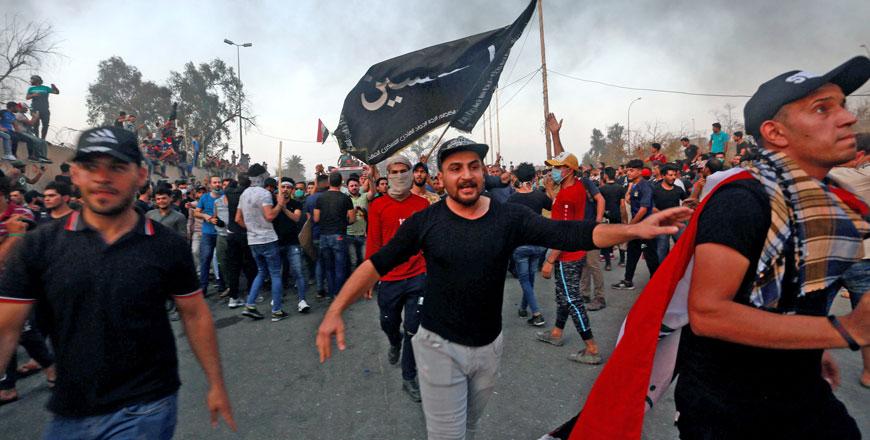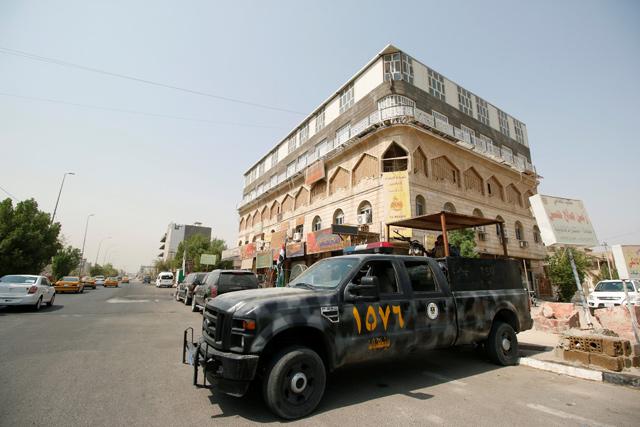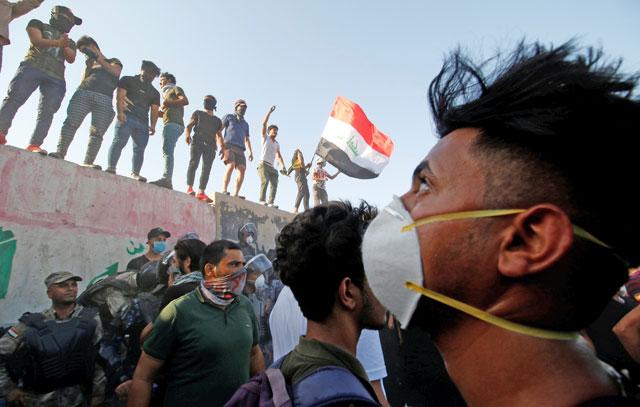You are here
Iraq parliament holds emergency talks as Basra burns
By AFP - Sep 08,2018 - Last updated at Sep 08,2018

Iraqi protesters gather during an anti-government protest near the building of the government office in Basra on Friday (Reuters photo)
BAGHDAD — Iraqi lawmakers met Saturday in emergency session Saturday to discuss the crisis in public services in main southern city Basra after 12 protesters were killed this week, the Iranian consulate torched and its airport hit by rockets.
Prime Minister Haider Al Abadi described the unrest as “political sabotage” as he joined the session along with several ministers, charging that “the question of public services” was being exploited for political ends.
His government has announced the allocation of an unspecified amount of extra funds for Basra, although demonstrators say that billions of dollars in emergency funding pledged in July has failed to materialise.
In a session attended by 172 deputies in the 329-seat house, Abadi traded barbs with Basra’s governor, Asaad Al Eidani, who is also parliament speaker.
Basra has been rocked by protests since Tuesday, with demonstrators setting ablaze government buildings, the Iranian consulate and the offices of pro-Tehran militias and political parties.
The anger flared after the hospitalisation of 30,000 people who had drunk polluted water, in an oil-rich region where residents have for weeks complained of water and electricity shortages, corruption among officials and unemployment.
At least 12 demonstrators have been killed and 50 wounded in clashes with security forces, according to the interior ministry.
Hours before parliament met, four rockets fired by unidentified assailants struck inside the perimeter of Basra airport, security sources said.
Staff at the airport, which is located near the US consulate in Basra, said flights were not affected.
The attack came after a day of rage in the southern city where hundreds of protesters stormed the fortified Iranian consulate, causing no casualties but sparking condemnation.
Abadi said he had instructed security forces to “act decisively against the acts of vandalism that accompanied the demonstrations”.
Iraq’s Joint Operations Command, which includes the army and police, vowed a “severe” response with “exceptional security measures”, including a ban on protests and group travel.
The foreign ministry called the attack on the consulate “an unacceptable act undermining the interests of Iraq and its international relations”.
Iranian Foreign Ministry spokesman Bahram Ghassemi denounced the “savage attack”, Iran’s Fars news agency reported.
Neglect, corruption
A spokesman for the consulate said that all diplomats and staff had been evacuated from the building before the protesters attacked, and that nobody was hurt.
Iran’s Ambassador to Iraq Iraj Masjedi said the consulate was “totally demolished” and charged that “foreign agents close to the US, Zionists and some Arab countries are trying to sabotage Iran-Iraq relations”, Iran’s ILNA news agency reported.
The wave of protests first broke out in Basra in July before spreading to other parts of the country, with demonstrators condemning corruption among Iraqi officials and demanding jobs.
Since then at least 27 people have been killed.
“We’re thirsty, we’re hungry, we are sick and abandoned,” protester Ali Hussein told AFP on Friday in Basra after another night of violence.
“Demonstrating is a sacred duty and all honest people ought to join.”
The anger on Basra’s streets was “in response to the government’s intentional policy of neglect”, the head of the region’s human rights council Mehdi Al Tamimi said.
Iraq has been struggling to rebuild its infrastructure and economy after decades of bloody conflicts, including an eight-year war with Iran in the 1980s, the US-led invasion of 2003 and the battle against the Daesh group.
In August, the oil ministry announced that crude exports for August had hit their highest monthly figure this year, with nearly 112 million barrels of oil bringing $7.7 billion to state coffers.
Iraq, however, suffers from persistent corruption and many Iraqis complain that the country’s oil wealth is unfairly distributed.
Radical solutions
Parliament said lawmakers would hear speeches by Abadi and key ministers and discuss the water contamination crisis, the latest breakdown in public services to spark public anger.
The meeting was demanded by populist Shiite cleric Moqtada Sadr, whose political bloc won the largest number of seats in May elections although a new government has yet to be formed.
Sadr has called on politicians to present “radical and immediate” solutions at Saturday’s session or step down.
Two months ago, Abadi pledged a multi-billion dollar emergency plan to revive infrastructure and services in southern Iraq, one of the country’s most marginalised regions.
The premier is trying to hold onto his post in the next government and has formed an alliance with Sadr, a former militia chief who has called for Iraq to have greater political independence from both neighbouring Iran and the United States.
Related Articles
BASRA, Iraq — Prime Minister Haider Al Abadi sought to ease tensions in Iraq’s oil-rich south on Monday with a visit to Basra, rocked by dea
BASRA, Iraq — After several nights of deadly protests, calm returned to the southern Iraqi city of Basra on Sunday, even as residents stuck
BAGHDAD — Iraqi Shiite leader Moqtada Sadr called on Thursday for "radical" solutions to a health crisis which has sparked mass rallies and

















